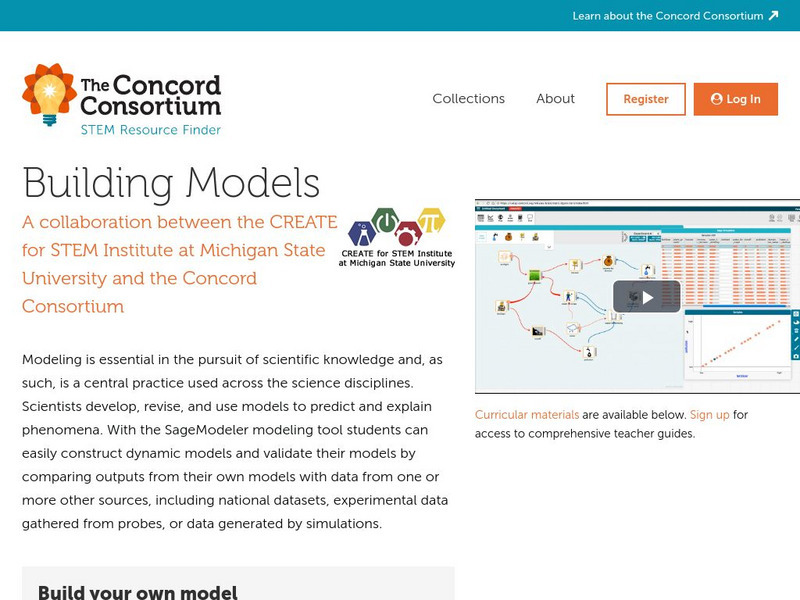Concord Consortium
Concord Consortium: Molecular Workbench Showcase: Chemistry, Reactions
Simulations that can help students visualize and understand concepts in chemistry like the collision theory, chemical reaction equilibrium, and polymerization.
Concord Consortium
Concord Consortium: Molecular View of a Gas
This simulation allows students to make observations about the structure and movement of particles in a gas.
Concord Consortium
Concord Consortium: Molecular View of a Liquid
This simulation allows students to make observations about the structure and movement of particles in a liquid.
Concord Consortium
Concord Consortium: Geniventure
Geniventure engages students in exploring heredity, genetics, and the protein-to-trait relationship by breeding and studying virtual dragons. Students play through six levels of challenges, conducting simulated experiments that generate...
Concord Consortium
Common Online Data Analysis Platform (Codap)
CODAP is a free, easy-to-use data analysis environment for students. Students can load their own data into an easy-to-use web-based data analysis tool to create their own datasets, share visualizations, and discover data-driven insights....
Concord Consortium
Concord Consortium: Greenhouse Effect in a Greenhouse
In this activity, you will use a temperature sensor to relate changes in sunlight to the temperature of the air trapped in a container.
Concord Consortium
Concord Consortium: Exploring Earth's Seismicity
This sequence is an introduction to plate tectonics using evidence from topographical maps, earthquake location and depth, and volcano location using the Seismic Explorer model to investigate patterns of earthquake data and to infer the...
Concord Consortium
Concord Consortium: Seismic Explorer
Explore the pattern of earthquakes on Earth, including magnitude, depth, location, and frequency.
Concord Consortium
Concord Consortium: Sage Modeler
Sage Modeler is a systems modeling tool to facilitate the building of dynamic models.
Concord Consortium
Concord Consortium: Stebbins
Stebbins is a game about evolution. Students collect data as predators eating colored circles on a colored background, being careful to avoid the poisonous ones. Data analysis reveals how the population changes color over time, and can...
Concord Consortium
Concord Consortium: Smartgraphs: Equivalent Graphs
Students investigate graphs that are equivalent, in the sense that they represent the same data, though they look different because they employ different scales.
Concord Consortium
Concord Consortium: Geniversity for Geniverse
Geniversity has been designed to help teachers use Geniverse, free web-based software for high school biology that engages students in exploring genetics by breeding and studying virtual dragons.
Concord Consortium
Concord Consortium: Population Curve: Significance of Breakpoints
Learn about three models of population growth: linear, exponential, and logistic. Then conduct a population experiment to see how populations can work in the real world, and see how linear graphs can help simplify complicated ones.
Concord Consortium
Concord Consortium: Smartgraphs: Hurricane Katrina
Students are given graphs relating to Katrina, the hurricane that devastated New Orleans and much of the gulf coast in 2005, and are asked to identify various events, such as the moment when the hurricane made its closest approach to New...
Concord Consortium
Concord Consortium: Smartgraphs: Graphs Tell a Story
Students match a word story to the correct set of graphs involving temperature change over time.
Concord Consortium
Concord Consortium: Stem Resources: Boiling Point
An interactive tool where students can explore why different substances have different boiling points. They will learn how the forces of attraction in polar and non-polar substances affect their properties, e.g., the boiling point.
Concord Consortium
Concord Consortium: Stem Resources: Baggie Chemistry
Observe chemical and physical changes with this lab using everyday household items. Lab includes procedure and online data collection tool where answers can be saved and graded by teacher.
Concord Consortium
Concord Consortium: Stem Resources: Catalysts
Want to see how a catalysts help a reaction happen? In this science simulation, students can experience a reaction that has gone forward due to a catalyst.
Concord Consortium
Concord Consortium: Stem Resources: Evaporative Cooler
Build an air conditioner in this activity using a washcloth, coat hanger, aluminum pan, and three-speed fan. After constructing the air, students will measure the air, water, and wet cloth temperature as well as measuring the humidity....
Concord Consortium
Concord Consortium: Stem Resources: Greenhouse Effect in a Greenhouse
A lab where students will construct their own small greenhouse out of a plastic container, plastic wrap, and different materials to observe the effect this has on temperature. Data is collected, graphed, and saved online to be graded by...
Concord Consortium
Concord Consortium: Stem Resources: How Electrons Move
A collection of interactive activities and games to explore how electric fields and magnetic fields move electrons and charged particles in directions that can be planned. Understand that knowing how to control the movement of electrons...
Concord Consortium
Concord Consortium: Stem Resources: How Loud, How High?
What are ways to describe sound? Using the program downloaded called Sound Grapher and the microphone on the computer, students can investigate the frequency, wavelength, amplitude, and velocity of sound waves. Activity includes detailed...
Concord Consortium
Concord Consortium: Stem Resources: Is There Life in Space?
In this investigation, students will explore whether or not there can be life outside of Earth by using planet hunting models to discover how scientists find new planets. They will perform simulated spectroscopic measurements to...
Concord Consortium
Concord Consortium: Stem Resources: Launching a Satellite
Do you think you could fire an "unpowered" object into orbit? By controlling the angle and speed at which the satellite is launch, students will try to launch a satellite into space with this computer model. Activity includes questions...


















